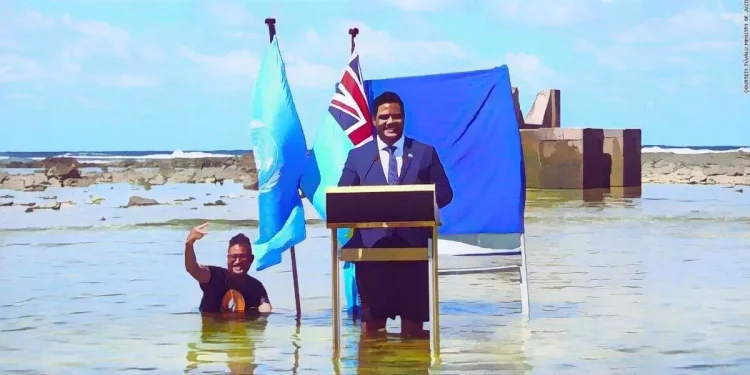Tuvalu has announced its intention to recreate itself in the metaverse in an attempt to “preserve” the Pacific island nation before rising sea levels submerge it completely.
The government also stressed the urgency of a shared global effort to combat climate change, which has put Tuvalu in constant peril.
There is no doubt that this is an interesting idea, because it may open the door to an existence that many are unaware of, allowing anyone, anywhere in the world, to have experiences now reserved only for an elite.
“As our land disappears, we have no choice but to become the world’s first digital nation,” said Tuvalu’s foreign minister, Simon Kofe, in a speech at the COP27 climate summit, against the backdrop of a digital island. “Our island, ocean and culture are our people’s most precious assets, and to keep them safe from harm, whatever happens in the physical world, we will move them to the cloud.”
Tuvalu and global warming
Tuvalu is extremely threatened by global warming and scientists predict it will be uninhabitable in the next 100 years or less. High tides cause severe flooding early in the year and residents fear the situation will worsen. Last year, Kofe spoke at COP26 while submerged in water to underscore the extreme importance of climate action.
“After COP26, the world failed to act, so it was us in the Pacific who had to act,” Kofe said in this year’s speech. “We have seen the temperature rise continue to be well above 1.5 degrees Celsius, indicating the imminent demise of the island.”
The truth is that, for this to be possible, we must advance in more than just better Virtual Reality glasses, we must improve the contents, the quality of the network, the policies of management and control of virtual worlds… in so many points that it is impossible to mention them all without getting out of the news of the day.
The Pacific nation of Tuvalu plans to create a metauniversal version of itself, a way of responding to the rising sea levels that threaten its existence.
It was Tuvalu’s Minister of Justice, Communications and Foreign Affairs, Simon Kofe, who made the announcement via a digital message to leaders present at COP27, a plan that will be implemented in a “worst case scenario,” creating a digital twin of Tuvalu in the metaverse to replicate its beautiful islands and preserve its culture.
Tuvalu might be the first country in the world to exist only in cyberspace, but if global warming continues unchecked, it won’t be the last.
Obviously, Tuvalu would prefer to avoid the effects of climate change and remain a terrestrial nation, but in the metaverse they could conserve:
- Territory: enjoy the natural beauty of the island, which can be enjoyed in different ways.
- Culture: the ability of Tuvaluans to interact with each other in a way that preserves shared language, norms and customs, wherever they are.
- Sovereignty: if the land over which the Tuvalu government has sovereignty were to be lost, at least it could have control over the population within the virtual world.
We’re only talking about 12,000 people, but even then it would be a technological challenge to replicate it digitally.
Kofe is well aware that the metaverse is not an answer to Tuvalu’s problems, but he has left a message that needs to be heard.
Tuvalu island
Tuvalu, a group of nine islands and 12,000 people halfway between Australia and Hawaii, has long been a cause for complaint about the dangers of climate change and rising sea levels.
Up to 40% of the capital is submerged by high tide and the entire country is expected to be underwater by the end of the century.
Kofe stated he was hoping that the introduction of a virtual nation might allow Tuvalu to hold to feature as a state although it became absolutely submerged.
This is important as the government begins its efforts to ensure that Tuvalu remains internationally recognized as a state and that its maritime boundaries – and the resources in those waters – are maintained even if the islands are submerged.
Follow us on our social networks and keep up to date with everything that happens in the Metaverse!.
Twitter Linkedin Facebook Telegram Instagram Google News












































